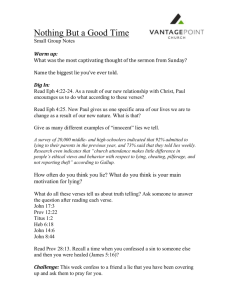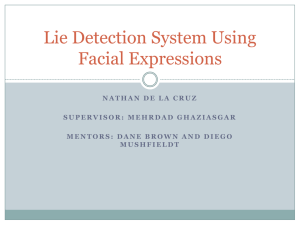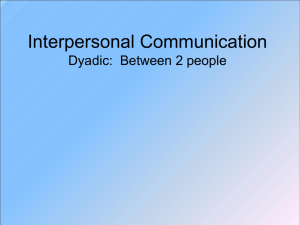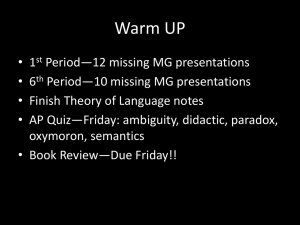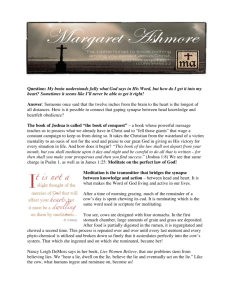Lying
advertisement
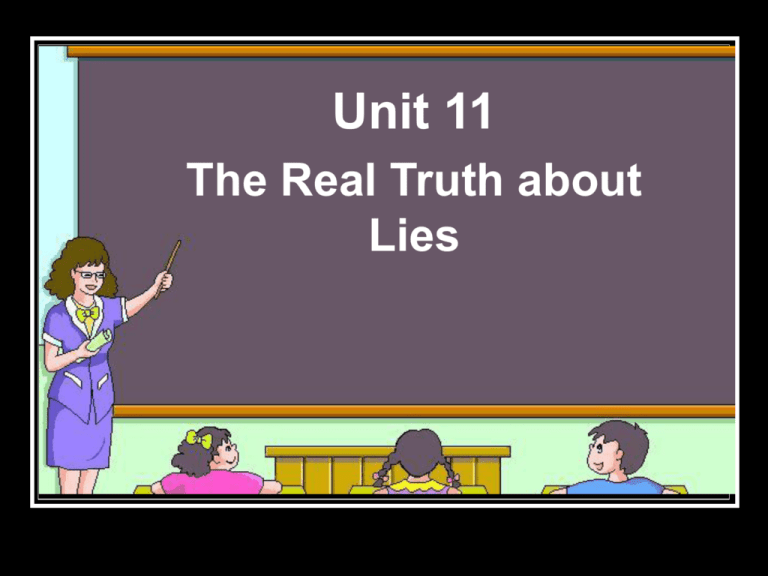
Unit 11 The Real Truth about Lies Warming up activities Background information Global study of Text I Structural analysis Detailed study of Text I Comprehension questions of Text I Exercises Grammatical items Warming up activities 1.If your good friend buys a new MP3 or a new mobile phone which you dislike intensely, and asks for your opinion about it, what will you say? 2.When do you think people lie? 3. Why do people lie? 4.To whom do people most likely to lie? 5. How would you feel if somebody lied to you for your own good? 6. What’s your view of white lies? 7. Have you ever lied? examples Open discussion 1.What topics are husbands, wives, boyfriends and girlfriends likely to lie about? 2. If once a cheater, always a cheater? 3. If you have done something wrong, should you confess or tell a lie or keep it a secret? 4. How do you rebuild, restore or regain trust after it has been destroyed? The real truth about lying Reports on the psychology of lying : Community members lied in one-fifth of their social interactions; students, one-third. Lying was more common in phone calls than in face-to-face chats. One lie in seven was discovered--as far as the liars could tell. A tenth of the lies were merely exaggerations, while 60 percent were outright deceptions. Most of the rest were subtle lies. More than 70 percent of liars would tell their lies again. Everyday lies are really part of the fabric of social life. While some lies damage relationships and destroy trust, other fibs fulfill important interpersonal functions, like smoothing over awkward situations or protecting fragile egos. 1. To say 'fingers crossed!' (and sometimes hold up your crossed fingers) means 'I hope this succeeds!'. 2. To keep your fingers crossed secretly when you tell a lie absolves you from any responsibility for that lie. If your lie is discovered, you can claim to have had your fingers crossed at the time. (If you're unable to cross your fingers while telling the lie, you can cross any other part of your body – legs, feet, etc.) Telling A Lie - Fingers Crossed Behind Back Sometimes children will hold their hand behind their back and cross their fingers before telling a lie. In Christian medieval Europe, this was a common way to ward off evil spirits or to invoke forgiveness. Fingers crossed for you To err is human but lying is not the solution for our serious problems, so we have to be honest with others particularly our friends. Quotes reading—lie & truth Let sleeping dogs lie. Truth is beautiful, without doubt; but so are lies. - - - Ralph Waldo Emerson A lie stands on one leg, truth on two. - - - Benjamin Franklin Truth is completely spontaneous. Lies have to be taught. - - - Richard Buckminster Fuller Jr. Truth is completely spontaneous. Lies have to be taught. - - - Richard Buckminster Fuller Jr. It is always the best policy to tell the truth, unless, of course, you are an exceptionally good liar. - - Jerome K. Jerome Truth is the safest lie. - - - Jewish Proverb Truth never damages a cause that is just. - - - Mohandas K. Gandhi "Non-Violence in Peace and War" Beauty is truth, truth beauty,-that is all - - - John Keats "Ode on a Grecian Urn" It is hard to believe that a man is telling the truth when you know that you would lie if you were in his place. - - - H. L. Mencken I never know how much of what I say is true. - - - Bette Midler Let us begin by committing ourselves to the truthto see it like it is, and tell it like it is- to find the truth, to speak the truth, and to live the truth. - - - Richard M. Nixon , Speech, 9 Aug. 1968, Miami, accepting the presidential nomination. Rather than love, than money, than fame, give me truth. - - - Henry David Thoreau Truly, to tell lies is not honorable; but when the truth entails tremendous ruin, To speak dishonorably is pardonable. - - - Sophocles Lying is an act of aggression--against the recipient of the lie. Lies hurt people, they hurt companies and shareholders and they hurt relationships. Lying is also an act of weakness. The liar is unwilling to bear the responsibility of the truth-telling. Lying is the lazy way, the selfish way. Lying is an antisocial act, injuring the person lied to and any relationships binding liar and victim. About text I Topic –The Real Truth about Lies—white lies Selected from Reader's Digest in the November, 1999 Journalistic style Short paragraphs---18 paras Argumentative writing The University of Virginia The University of Virginia is distinctive among institutions of higher education. Founded by Thomas Jefferson in 1819, the University is public and remains the No. 2 best , according to the 2005 US News & World Report. Numerous distinguished alumni graduated from the university and now dominate various areas, a few of whom are the 28th president Wilson, Senator Robert Kennedy and Edward Kennedy; and world-famous director Mark Johnson. Bella DePaulo Professor Bella M. DePaulo is specialized in Social Psychology. For more than 20 years, She has studied the communication of deception. More recently, she has also been studying the social psychology of singles. She received her Ph. D. from Harvard University in 1979. She is the author of more than 100 publications, and her work has been funded by NSF(国家 科学基金会), NIMH(国家精神卫生研究院), and the National Academy of Education. Josephson Institute of Ethics The Joseph & Edna Josephson Institute of Ethics is a public-benefit, nonprofit, nonpartisan无党 派 and nonsectarian无宗派 membership organization founded by Michael Josephson in honor of his parents. While-reading questions How does the writer begin with the topic? How does he convince the readers “the real truth ” of lies? Find out words, phrases, expressions or sentences to indicate the consequences of lies? After-reading questions What is the tone of the author in the text? What is the author’s attitude towards lies? What is the author’s viewpoint in the text? What are the features of the text? What is your viewpoint of the topic? Text comprehension Tone : objective View: negative Way of convincing: scientific research; example; scholarly quotation Answer the following questions (page161) 1. What does Professor Bella DePaulo's study indicate about lying? What do most people think about lying? A: The study suggests that lying is a common phenomenon and most of the lies we tell are small, insignificant. She also points out that different sexes lie for different reasons, but nobody that lies suffers from a guilty conscience. 2. Why do people tell white lies? Do you think the lies will be well received once they are exposed? A: According to the passage, the nature of white lies is to seek self-interest: People tell white lies basically for self-promoting purposes. White lies may have different receptions in different cultures. In western cultures as is illustrated by the example, white lies may not be well received as the people value honesty and integrity more than caring and face value; but in the eastern cultures, they may be received as a sign of concern and respect for each other’s face. 3. What, according to the author, would be the consequences of lying? A: The consequences of lying fall into three aspects: The deceived may feel cheated and won't trust the liar any more; the liar will lose trust from the deceived and get entangled in the lies he fabricates; and the society as a whole would falter and collapse as its members do not trust each other any more. 4. Are all white lies unacceptable? What is the yardstick of acceptable lies? A: Not all white lies are unacceptable. Some falsehoods like setting somebody up for a surprise party or telling children about the tooth fairy can be justified. However, you have to consider the attitude of the deceived towards lying and the consequences, i.e. whether your act will undermine his trust in you. Structural analysis of the text Part 1—paras 1—6 Introducing the topic by reporting two survey results. Part 2—paras 7-11 Telling little white lies is a common practice and the reason for telling such lies by citing an example Part 3—paras 12-15 The consequences of telling lies Part 4—paras 16-18 Discussing whether lies should be voided at all costs Language work (1) 1.volunteer : v. to give or offer willingly or without being paid n. a person who gives help willingly 2. Profess: v. to make a claim (of / about) James professed to know everything about sculpture. He professed the greatest respect for the law. 3. earth-shattering: of the greatest importance to the whole world After years of hard work, they finally made an earth-shattering discovery. The new invention is of earth-shattering importance. 4. feign: v. to pretend to have or be; to put on a false air of She feigned to be ill in order not to do the exercises. He feigned surprise and they all believed him. 5. spare one's feelings : to avoid doing something that would upset somebody He simply wished to minimize the fuss and to spare her feelings. We carefully avoided mentioning the news to spare his feelings. 6. preoccupation: n.the state of constantly thinking or worrying about something Because of his preoccupation with his books, he didn't realize we were already back. Such preoccupation with your work isn't healthy. 7. Might that, too, be a lie? Is it possible to consider that a lie? "Might" here means "possibility. " Note that "may," when used to mean "possibility," is normally not used in a question. 8. prevarication: n. the state of avoiding giving a direct answer or making a firm decision After months of prevarication, a decision was finally made. When we questioned the authorities on the subject, we were met by prevarication. 9.ethics: n. moral correctness; moral principles 10.consultant: n. a person who gives specialist professional advice to others 11. devote ... to: to give all or a large part of one's time or resources to (a person, activity, or cause) I want to devote more time to my family. He devotes himself to philanthropy. 12. profession: n.a form of employment, especially one that is possible only for an educated person and that is respected in society as honorable She intends to make teacher her profession. According to the report, forty percent of the lawyers entering the profession are women. 13. pundit : n. a person who is an authority on a particular subject; an expert Mr. Johnson is a well-known political pundit. We've invited a foreign-policy pundit to give us a lecture. 14. shape or spin the truth: to modify the truth 15. client: n. somebody who pays for services or advice from a person or organization eg. a solicitor and his client Cf: a shopkeeper and his customer 16. Specialize in 17. Step out Language work (2) 18. Ubiquitous: a. seeming to be everywhere By the end of last century, the computer had become ubiquitous. We are now confronted with the ubiquitous spread of English. 19. Fib: n. a small unimportant lie Have you ever told fibs! She told innocent fibs like anyone else. 20. Invariably: ad. always It's invariably wet when I take my holidays. She invariably forgets to take her keys. 21. blurt out : to say something suddenly and without thinking, usually because one is nervous or excited To our surprise,he blurted his secret out at table. John blurted out that he dreamed of becoming a computer programmer. 22. lubricant :n. a substance such as oil which causes a machine to operate more easily 23. tangled: a. complicated or made up of many confusing parts After listening to his speech I thought his ideas and opinions were so tangled that I could. not vote for him. The floor of the forest was covered with tangled growth. Language work (3) 24. wear down: v.to reduce or become weaker until useless Eg: Heavy traffic and variable weather can wear down the surface of the road. Your back tyres are badly worn down; you should fit new ones. 25. Perception: n. the ability to see, hear and understand perceive : v. 26. warp : v. to (cause to) turn or twist out of shape Eg: Left in the garage where it was damp, the wooden frame had warped. The door must be warped. It won't close properly. 27. think highly of : to have a good opinion of We think highly of your suggestion. I can assure you that the management thinks very highly of you. 28. proliferation : n. a rapid increase in the amount or number of something Smoking triggers off cell proliferation. Over the past two years, we have witnessed the proliferation of TV channels. 29. cynicism: n. the belief that people always act selfishly 30. falter: v. lose power or strength in an uneven way, thus no longer making much progress Language work (4) 31. at all costs : under any circumstances 32. associate : n. somebody whom you work or do business with He is not a friend, but a business associate. 33. undermine: v. to gradually make sb. Or sth. less strong or effective She jealously tried to undermine our friendship. Lack of food has undermined his health. 34. rule of thumb : a rough method of calculation, based on practical experience I never weigh anything when I'm cooking — I just do it by rule of thumb. As a rule of thumb, a cup of filter coffee contains about 89mg caffeine. 35. confound : v. to confuse and surprise people, causing them to be unable to explain or deal with a situation His choice may confound us all. The dancer confounded the critics who said she was finished by giving the best performance of her life. 36. astound : v. to make somebody very surprised or shocked It astounds me that anyone could ever consider declaring war. He used to astound his friends with feats of physical endurance. Explain the sentences in your own words 1. “Psychological barriers wear down; the ability to make more distinctions can coarsen; the liar’s perception of his chances of being caught may warp.” (para12) One is less inhibited from lying; his ability to tell the truth from the falsehood is dulled; He may become less cautious against being caught. 2. Once they’ve become common enough, even the small untruths that are not meant to hurt encourage a certain cynicism and loss of trust. (para.15) When it becomes common enough to tell small lies, even the small unharmful ones will induce doubt and distrust. 3.The most understandable and forgivable lies are an exchange of what ethicists refer to as the principle of trust for the principle of caring. (para. 16) Those lies that are most understandable and acceptable are based on what moralists call the principle of love and care rather than that of trust. Vocabulary exercises I. Explain the underlined part in each sentence in your own words. 1. The lies were most often not what most of us would call earth-shattering. -- of the greatest importance to the whole world 2. According to DePaulo, women in their interactions with other women lied mostly to spare the other's feelings. ---to avoid hurting the other's feelings / to avoid doing something that would upset the other person 3. And then there are professions — lawyers, pundits, PR consultants — whose members seem to specialize in shaping or spinning the truth to suit clients' needs. ---telling the truth with a favourable emphasis or slant / modifying the truth 4. Philosopher Sissela Bok warns us that they can put us on a slippery slope. -- a course of action which can easily lead to something unacceptable, wrong, or disastrous 5. Are all white lies to be avoided at all costs? ---under any circumstances / whatever might happen (at any cost, whatever the cost) 6. And if you are not sure,Mark Twain has given us a good rule of thumb.(经验法则) --- a broadly accurate guide or principle, based on past experience rather than theory / a rough method of assessing or measuring sth., based on practical experience Translation 1.当哈姆雷特拿不定主意该采取什么行动时,他就装 疯。(feign) Hamlet feigned madness when he was hesitating what to do. 2. 搪塞是这个商人喜欢使用的技巧之一。 (prevarication) Prevarication is one of the techniques this businessman likes to employ. 3. 真理之光有时令人目眩,因此,善意的谎言随处可 见。(ubiquitous) Sometimes the light of the truth is just too dazzling, so white lies are ubiquitous. 4. 美国许多妇女声称她们对自己二等公民的地位感到 不满。(profess) Many women in America profess that they are unhappy with their status of second-class citizens. 5.一时冲动之下,他脱口说出了秘密。(blurt out) On the impulse of the moment, he blurted out the secret. 6.你应该摆脱偏见,抵制诱惑,不让任何东西扭曲你 的判断。(warp) You should get rid of any prejudice, resist temptations and let nothing warp your judgment. 7.他是一个过于敏感和富于想象力的人,经常在 头脑里编织依仗一张复杂的网络。(a tangled web) Being over-sensitive and imaginative, he often weaves a tangled web in mind. 8.他在伙伴中很受欢迎,因为他总是设法不去麻烦 别人。(spare) He is very popular among his peers as he always tries to spare others any trouble. Dictation Childhood is less clear to me than to many people: / When it ended I turned my face away from it / for no reason that I know about, / certainly without the usual reason of unhappy memories. / For many years that worried me, / but then I discovered / that the tales of former children are seldom to be trusted. / Some people supply too many past victories or pleasures / with which to comfort themselves, / and other people cling to pains, real and imagined, / to excuse what they have become. / I think I have always known about my memory. / I know when it is to be trusted / and when some dream or fantasy entered on the life, / and the dream, the need of dream, / led to distortion of what happened. (Source: Lilian Hellman, Julia. ) Text II To Lie or Not to Lie? ------The Doctor’s Dilemma by Sissela Bok Memorable Quote While all deception requires secrecy, all secrecy is not meant to deceive. Bok How do you understand it? ---Sissela Sissela Bok Swedish writer, philosopher, and educator. Among her works are: Lying: Moral Choice in Public and Private Life (1978), Secrets: On the Ethics of Concealment and Revelation (1983), and Alva Myrdal: A Daughter's Memoir (1991). To Lie or Not to Lie Parody: v. to copy someone’s style or attitude n. a piece of writing or music that copies a particular well-known style in an amusing way The title is a parody of the famous soliloquy of Hamlet—’ To be or not to be, that is the question.” Questions for discussion 1. According to the author, in what line of work is honesty sacrificed for “ greater needs”? In medicine, law, politics, journalism, etc., is deception practiced for “ greater needs.” 2. What according to some doctors, is the fundamental principle of the medical profession? “ As far as possible do no harm.” 3. What are the negative effects of “ benevolent deception” on patients? The patients may feel betrayed, and their autonomy is intruded. And they cannot make informed decisions about their health and life; and it can also prolong recovery and affect treatment. 4. How will the medical profession and its staff be affected by “ benevolent deception”? It may cause the erosion of integrity of the medical profession and affect those that do not tell lies to their patients. It may even induce lawsuits and the endless process of litigation. 5.If you were a patient, would you like to know the truth that you would have only a few months to live? And if you were a doctor, how would you break the news to your patient? This is an open question. Ask students to Role play it in pairs. Oral activities Group discussion---who do you think is in the wrong, the officer of the Foreign Affairs Office or the American professor? An American exchange professor is now teaching in a university in Southern China. The flat he is accommodated in by the school authority faces an open-air market and every morning he is woken up by the noise outside. He decides to move to the other end of the building and goes to the Foreign Affairs Office of the university. The reply he receives is “ We must give it more thought.” he returns to his home and waits for two weeks, but no reply is given. He waits another two weeks, still without any answer. He feels cheated and decides to leave China the next semester. Writing practice Write an essay of about 300 words on the following topic: My View of Telling Lies THANKS FOR YOUR ATTENTION!
